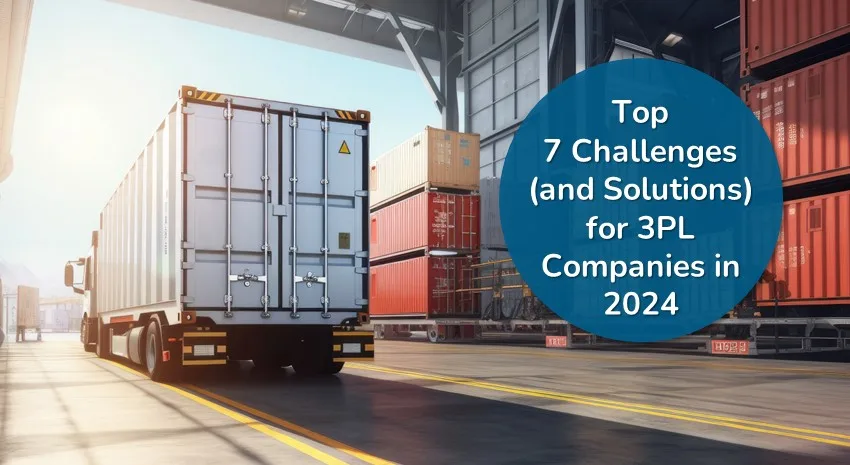Top 7 Challenges Facing the 3PL Industry in 2024

Third-party logistics (3PL) companies play a vital role in today’s supply chain. The rise in eCommerce and persistent consumer demand has led to many new opportunities for the industry. And yet, as we start a new year, 3PL companies face many challenges in today’s complex and dynamic business environment.
Key 3PL challenges and solutions
1. Talent acquisition and retention
The logistics industry is grappling with a tight labor market. Experienced personnel, particularly Baby Boomers, are retiring, leading to a loss of valuable knowledge. And attracting and retaining new talent, from truck drivers to supply chain planners and data scientists, is a persistent challenge.
One way 3PL companies are responding is by leveraging technology to streamline operations, increase efficiency, and reduce errors.
2. Rising transport and energy costs
Increasing fuel prices and transportation costs are impacting the bottom line of 3PLs. Negotiating client contracts becomes challenging as 3PLs strive to manage and pass on rising costs while maintaining competitiveness.
3PL companies can minimize the impact of rising fuel costs by optimizing route planning, negotiating long-term contracts with clients, and adopting pricing strategies to adapt to fluctuating costs.
3. Globalization pressures
Globalization has led to increased competition and complex supply chains. Many smaller 3PLs struggle to survive in a market dominated by larger entities, and takeovers and mergers are common as companies seek to secure their position in a globalized market.
In response, more 3PL companies have decided to focus on niche markets, build strategic partnerships, and invest in technology for efficient global supply chain management. Specializing in specific regions or industries can also provide a competitive edge.
4. Technological advances
Technology, including automation, artificial intelligence, and data analytics, is advancing rapidly. Integration of new technologies into existing systems can be costly and time-consuming. The risk of falling behind due to inadequate technological capabilities is a significant concern.
Successful 3PL companies are investing in automation and data analytics to optimize efficiency and provide greater insight into their operations. Companies should look to collaborate with technology partners for the best way to implement a phased approach to technology integration and ensure adequate employee training.
5. Supply chain disruptions
Natural disasters, geopolitical events, and global crises (as seen with the COVID-19 pandemic) can disrupt supply chains.
Developing resilient and flexible supply chain strategies is crucial to mitigating the impact of unforeseen disruptions. These strategies include diversifying suppliers, investing in technology for real-time visibility into the supply chain, and establishing contingency plans to respond swiftly to disruptions.
6. Data security and cyber threats
As logistics operations become increasingly digitized, the risk of cyber threats and data breaches grows. In addition, protecting sensitive information and maintaining the integrity of digital systems are constant concerns.
Companies must work to protect themselves from external and internal cybersecurity threats and train employees to identify potential threats Download ArcherPoint’s Cybersecurity Threats and Countermeasures eBook to learn more.
7. Capacity constraints
Warehouses are often built to meet the demands of the time. Many companies are currently running at near-maximum capacity, and the costs of expanding the warehouse are rising.
Companies facing warehouse capacity constraints and unable to afford larger options are forced to use their existing space more efficiently. For many companies, investing in technology to optimize warehouse capacity utilization while planning for future growth is the solution.
Moving forward
Addressing these challenges requires combining technological innovation, strategic partnerships, and proactive risk management strategies. Regularly reassessing the business landscape and staying ahead of industry trends will contribute to long-term success in the 3PL sector.
Contact ArcherPoint to learn how we can help you optimize your operations with Microsoft Dynamics 365 Business Central, including warehouse management, logistics, data analytics, and business intelligence solutions.
